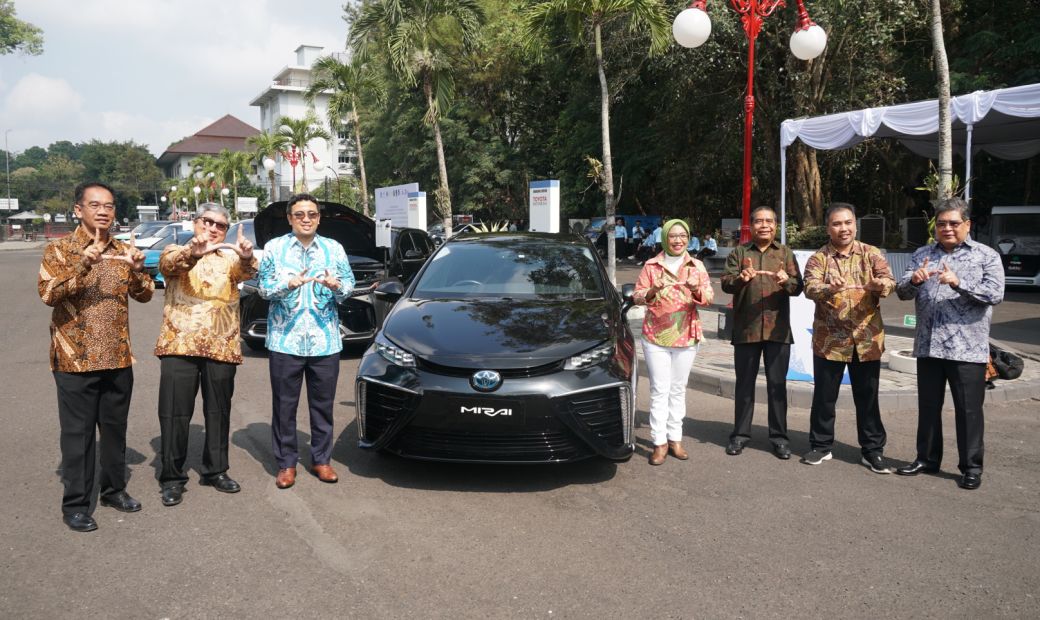Please fill in some of the data provided below to receive the latest Toyota-related news and information in your email.


As a country with vast energy resilience potential, Indonesia boasts an abundance of diverse and widespread sources of Renewable Energy (RE), including a particular focus on green hydrogen. Green hydrogen is emerging as the clean energy solution for the future, especially in the transportation sector, which is committed to reducing emissions. Green hydrogen represents a new potential source of clean energy, emitting only water vapor and leaving no residues in the air or additional carbon emissions, thereby strongly supporting decarbonization goals.
Indonesia's Potential as a Frontier for Hydrogen Technology Utilization
The potential for green hydrogen derived from Hydropower Plants (PLTAs) is predominantly found in North Kalimantan, Aceh, West Sumatra, North Sumatra, and Papua. The government claims that Indonesia has the capacity to produce electricity from RE with a capacity of 3,000 gigawatts (GW), of which only about 12.5 GW is currently utilized. The government is optimistic about increasing electricity production from RE sources to reach 21 GW, in line with the Power Supply Business Plan (RUPTL) for PLN 2021-2030. Furthermore, Indonesia's neighboring country, Singapore, has expressed interest in importing green hydrogen produced in Indonesia for domestic use.
Recognizing the future potential of hydrogen, particularly in the transportation sector, as a significant contributor to achieving the government's 2060 Net Zero Emission (NZE) target, PT Toyota Motor Manufacturing Indonesia (TMMIN) is supporting a national seminar organized by Gajah Mada University (UGM) in Yogyakarta, with the theme "Accelerating the Development of the Hydrogen Ecosystem in the Industrial and Transportation Sectors Towards Net Zero Emission (NZE) 2060 in Indonesia." This theme aligns with the growing demand for hydrogen, especially in the transportation sector.
"The utilization of multi-technology from various energy sources with a focus on emission reduction is a necessity to achieve the NZE target for a green future for all generations. Especially in the transportation sector, which is a major focus of decarbonization. As part of the solution for Indonesia's transportation, this national seminar advocates for the development of alternative energy in the transportation sector towards NZE 2060 in Indonesia, with a focus on hydrogen technology," said Nandi Julyanto, President Director of PT TMMIN, during the seminar's opening.
This national seminar features speakers from the government, academia, and industry, including a keynote speech on the government's vision and strategy for developing green energy to achieve the NZE target, delivered by Airlangga Hartarto, Coordinating Minister for Economic Affairs of the Republic of Indonesia and an alumnus of UGM. The opening remarks will be provided by Prof. Dr. Ova Emilia, M. Med. Ed., Sp. OG (K)., Ph.D., the Rector of UGM. Additionally, representatives from the Ministry of Energy and Mineral Resources (ESDM), including Andriah Feby Misna, S.T., M.T., M.Sc, will present Indonesia's energy roadmap and its current status. The seminar will also include a comprehensive presentation by Prof. Dr. Eng. Eniya Listiani Dewi of the National Research and Innovation Agency (BRIN) on global hydrogen movements, the hydrogen economy, and its potential in Indonesia.
Further presentations will be given by Prof. Deendarlianto from UGM's Center for Energy Studies (PSE) on energy mix strategies and hydrogen ecosystem development in Indonesia. Amirullah Setya Hardi, S.E., Cand.Oecon., Ph.D, from UGM's Faculty of Economics and Business, will discuss market research, followed by Oki Muraza, Senior Vice President, Research, & Technology Innovation at Pertamina Persero, who will share strategies for accelerating hydrogen adoption in Indonesia. The presentation will conclude with insights from Dr. Indra Chandra S., a representative from Toyota Daihatsu Engineering & Manufacturing (TDEM), discussing technology readiness in the automotive sector and best practices from other countries.
Meeting NZE Targets Requires Collaboration from All Parties
The use of hydrogen aligns with the mission of decarbonizing the manufacturing sector, which the Ministry of Industry of the Republic of Indonesia aims to achieve by 2050, a decade earlier than initially targeted. Simultaneously, the Ministry of Energy and Mineral Resources (ESDM) has initiated the Renewable Energy-Based Industrial Development (REBID) program, harnessing hydropower, solar, geothermal, biomass, and hydrogen to achieve a cleaner energy mix.
"In the pursuit of Net Zero Emission in Indonesia, multiple parties have already started creating three ecosystems: Biofuel, Batteries, and Hydrogen. For Hydrogen, Pertamina, PLN, Fertilizer Plants, and Samator are already involved. With the national hydrogen strategies implemented by all stakeholders, Indonesia has a significant opportunity for the development of green hydrogen to stay competitive globally and, more importantly, to ensure a green future for our current and future generations," said Bob Azam, Vice President Director of PT TMMIN.
Significant Electrification Opportunities: Toyota Relies on Hydrogen Technology
In addition to the development of environmentally friendly internal combustion engine (ICE) vehicles with low fuel consumption and emissions, electrified vehicles, and the use of hydrogen technology are considered viable options for the automotive industry. Toyota Motor Corporation (TMC), a leader in hydrogen technology, began mass production of the Toyota Mirai ten years ago, precisely in 2014. The Toyota Mirai is a Fuel Cell Electric Vehicle (FCEV) that relies on hydrogen as its fuel source, eliminating the dependence on fossil fuels.
The Toyota Mirai, designed as an electric motor and hydrogen fuel-based vehicle, has already entered its second generation, launched in 2019. Besides FCEV technology, Toyota is also developing vehicles with hydrogen-powered internal combustion engines (Hydrogen Internal Combustion Engine/HICEV), marking a new step in Toyota's technology journey towards achieving the global NZE commitment by 2050. Toyota believes that the impact of clean technology can be widely experienced in markets worldwide.
Mirai Takes Center Stage at the xEV Center
Toyota Indonesia believes in providing practical and sustainable solutions by combining various choices and technologies, including Low-Cost Green Car (LCGC), flexy engines, Hybrid Electric Vehicles (HEV), Plug-in Hybrid Electric Vehicles (PHEV), Battery Electric Vehicles (BEV), and hydrogen.
"Toyota Mirai can now be seen firsthand at the xEV Center, which is PT TMMIN's facility for learning and developing electrification capabilities and green energy. In the future, the xEV Center will expand its facilities to become the Toyota Capability Center, incorporating Eco Renewable Energy and Research areas, followed by Mobility. In the first phase, the primary focus is on electrification technology, and the second phase will emphasize green energy, while Mobility will be the focus in the third phase," added Bob Azam.
In the green energy phase, various technologies and facilities using renewable energy sources, such as hydropower (PLTA), wind turbines, hydrokinetic turbines, hydrogen, and solar panels, will be introduced at the xEV center, showcasing the electrification ecosystem from generation to consumption. In the Mobility phase, the xEV center will provide insight into an Intelligent Transport System showcase, among other offerings.
#ToyotaIndonesiaMedia/Journalist Contact : [Memuat email...]
Non Media / Non Journalist Contact : [Memuat email...]

© 2024 Toyota Motor Manufacturing Indonesia. All Rights Reserved.
